
Construction Economics and Building
Scope & Guideline
Unlocking Knowledge at the Intersection of Construction and Economics
Introduction
Aims and Scopes
- Sustainable Construction Practices:
The journal emphasizes the importance of sustainability in construction, examining how environmental, social, and economic dimensions interact in construction projects. - Digital Technologies in Construction:
A core focus on the integration of digital technologies such as Building Information Modeling (BIM), big data, and digital asset management, analyzing their impact on productivity and efficiency in construction. - Construction Economics and Finance:
Explores the economic aspects of construction, including cost management, funding sources, and financial strategies for infrastructure projects. - Labour and Workforce Management:
Investigates issues related to workforce dynamics, including job perception, recruitment and retention, and the impact of organizational culture on productivity. - Health and Safety in Construction:
Addresses health and safety challenges in the construction industry, focusing on strategies to mitigate risks and enhance worker safety. - Knowledge Management in Construction:
Examines the role of knowledge transfer and management practices in enhancing project delivery and organizational learning in the construction sector.
Trending and Emerging
- Climate Change and Adaptation Strategies:
An increasing number of studies focus on strategies for climate change adaptation, emphasizing the importance of sustainable practices in construction to mitigate environmental impacts. - Integration of Digital Construction Technologies:
There is a growing emphasis on the adoption of digital tools and technologies, such as BIM and data analytics, which are reshaping project management and operational efficiencies in the industry. - Social Sustainability and Gentrification:
Emerging discussions around the social implications of construction practices, including gentrification and affordable housing, indicate a shift towards considering broader societal impacts. - Resilience in Construction Management:
Research highlighting resilience strategies in construction projects is on the rise, addressing the industry's need to adapt to disruptions such as pandemics and natural disasters. - Workforce Diversity and Inclusion:
An increasing focus on diversity and inclusion within the construction workforce reflects a broader societal shift towards equity and representation in traditionally male-dominated fields.
Declining or Waning
- Traditional Project Management Approaches:
There seems to be a decline in papers focused on conventional project management techniques, as the industry increasingly turns towards agile and innovative methodologies. - General Risk Management Strategies:
The frequency of discussions around generic risk management frameworks is waning, possibly as the field moves towards more tailored and project-specific risk analyses. - Low-Tech Solutions and Practices:
As the construction industry evolves with technological advancements, traditional low-tech solutions and practices are becoming less prominent in scholarly discussions. - Conventional Contract Administration:
Papers focusing on standard contract administration practices appear to be decreasing, indicating a shift towards more integrated and collaborative contractual approaches. - Single-Dimensional Economic Analyses:
There is a noticeable reduction in studies that examine economic factors in isolation, suggesting a growing recognition of the need for multi-dimensional analyses that incorporate social and environmental aspects.
Similar Journals

Russian Journal of Building Construction and Architecture
Elevating Architecture through Innovation and ResearchRussian Journal of Building Construction and Architecture (ISSN: 2542-0526; E-ISSN: 2542-0526), published by the esteemed Voronezh State Technical University, serves as a vital platform for disseminating innovative research and practical applications in the fields of building construction and architecture. This journal, situated in Voronezh, Russia, aims to explore both the theoretical and empirical aspects of contemporary architecture and construction practices, fostering a robust dialogue among researchers, professionals, and academics. With an emphasis on open access to knowledge, the journal significantly contributes to global discourse by ensuring that findings are accessible to a wide audience. Underlining the importance of sustainable development and cutting-edge technologies in construction, the journal strives to publish high-quality research that addresses the challenges faced in today’s building environment, making it an invaluable resource for those committed to advancing the industry.

Organization Technology and Management in Construction
Exploring cutting-edge solutions in construction and engineering.Organization Technology and Management in Construction is a prominent open-access journal dedicated to advancing knowledge in the fields of building and construction, civil and structural engineering, and the management of technology and innovation. Published by SCIENDO, this journal has established itself as a vital platform for researchers, professionals, and students since its inception in 2016, providing unrestricted access to cutting-edge research that drives the industry forward. With an impressive quartile ranking of Q2 in both Building and Construction and Civil and Structural Engineering, alongside respectable positions in various management categories, the journal serves as a critical resource for those seeking to explore innovative management approaches and technological advancements in construction. The journal's commitment to open access reflects a dedication to disseminating knowledge widely, ensuring that all stakeholders in the field can benefit from the latest developments. Operating out of Warsaw, Poland, the journal aims to foster collaboration and discourse among a diverse community of scholars and practitioners, playing an essential role in shaping the future of construction management.
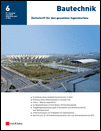
Bautechnik
Shaping the future of architecture and engineering excellence.Bautechnik is a premier academic journal in the fields of Building and Construction and Civil and Structural Engineering, published by ERNST & SOHN in Germany. With a history dating back to 1969 and a significant converged timeline through various years, this journal offers a rich repository of peer-reviewed research dedicated to advancing the principles, methodologies, and innovations within its domains. Bautechnik is currently ranked in the Q3 category for both building and construction, as well as civil and structural engineering, indicating its relevance and contribution to the academic community. Though it does not offer open access, its curated content is accessible to a global audience of researchers, professionals, and students striving for excellence in their fields. The journal aims to foster discussions and disseminate knowledge that impacts the future of construction, architecture, and engineering practices.
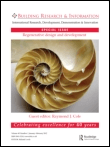
BUILDING RESEARCH AND INFORMATION
Advancing knowledge in Building and Construction.BUILDING RESEARCH AND INFORMATION is a premier academic journal dedicated to the advancement of knowledge in the fields of Building and Construction as well as Civil and Structural Engineering. Published by Routledge Journals, Taylor & Francis Ltd, this journal boasts an impressive Q1 ranking in both categories as of 2023, emphasizing its reputation for disseminating high-quality research. Established in 1991, it has continually provided a vital platform for scholarly dialogue on innovative building practices, sustainable construction techniques, and cutting-edge engineering solutions, with ongoing contributions accepted until 2024. The journal is renowned for its extensive insights and interdisciplinary approach, and with a Scopus rank placing it in the 88th percentile for both building and construction engineering and civil and structural engineering, it presents an exceptional opportunity for researchers, professionals, and students to engage with and publish influential findings. While the journal is not open access, it remains a cornerstone for those aiming to deepen their understanding of contemporary challenges and trends in the built environment.

Revista Ingenieria de Construccion
Advancing the Frontiers of Construction EngineeringRevista Ingenieria de Construccion is a prominent open-access journal dedicated to advancing knowledge and practice in the fields of building and construction engineering, as well as civil and structural engineering. Published by the Pontificia Universidad Católica de Chile, specifically the Department of Engineering and Construction Management, this journal has been providing free access to quality research outputs since 1986, ensuring that vital information is available to both practitioners and academics globally. With its current placement in the Q4 category of both the Building and Construction and Civil and Structural Engineering quartiles, it serves as a platform for innovative studies and critical discussions, positioning itself strategically within the academic landscape. The journal is indexed in Scopus, ranking #157 in Building and Construction and #291 in Civil and Structural Engineering, reflecting the growing impact and relevance of its contributions. Researchers, professionals, and students are encouraged to engage with the rigorous and diverse content published within its pages, fostering a vibrant academic and practical discourse.
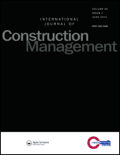
International Journal of Construction Management
Unveiling Trends in Architectural InnovationInternational Journal of Construction Management, published by TAYLOR & FRANCIS LTD, is a premier academic journal that caters to the evolving field of construction management and its associated disciplines. With an ISSN of 1562-3599 and an E-ISSN of 2331-2327, this journal is distinguished by its outstanding performance, ranking in Q1 across multiple categories including Architecture, Building and Construction, and Management of Technology and Innovation as of 2023. The journal's significant impact is reflected in its Scopus ranks, notably placing 4th in Architecture and 25th in the Building and Construction category, demonstrating its critical role in advancing both academic research and practical applications in the construction sector. With a timeline of convergence from 2009 to 2024, the journal provides a platform for innovative research, case studies, and reviews that align with industry trends and challenges. Researchers, practitioners, and students are encouraged to explore the journal's invaluable contributions to the discourse in construction management, fostering a deeper understanding of best practices, technologies, and strategies essential for the industry's future.
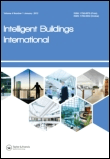
Intelligent Buildings International
Shaping Tomorrow's Buildings with Today's InnovationsIntelligent Buildings International, published by Taylor & Francis Ltd, is a premier journal dedicated to advancing knowledge in the interdisciplinary domains of building construction, civil engineering, computer science applications, and planning. Since its inception in 2009, this journal has become a vital resource for researchers, professionals, and students, offering a platform for high-quality scholarly articles that explore innovative strategies and technologies in intelligent building design and efficiencies. With its significant impact factor reflected in its Q2 and Q3 quartile rankings across various related fields, and strong Scopus rankings placing it among the top journals in Geography, Building, and Civil Engineering, Intelligent Buildings International stands out for its commitment to fostering research that enhances the sustainability and functionality of contemporary architectural practices. Readers can access a wealth of articles that illuminate the complexities of smart building technologies and their implications for future construction practices, making it an essential addition to any academic library.
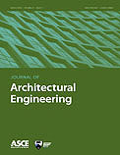
Journal of Architectural Engineering
Shaping Sustainable Environments Through Innovative EngineeringThe Journal of Architectural Engineering, published by the ASCE (American Society of Civil Engineers), stands as a pivotal resource in the interdisciplinary fields of architecture and engineering. With an ISSN of 1076-0431 and E-ISSN 1943-5568, this journal has garnered a notable reputation since its inception in 1995, currently converging towards 2024. Boasting a Q1 ranking in Architecture and Visual Arts and Performing Arts, alongside respectable Q3 rankings in Building and Construction and Civil and Structural Engineering, the journal places itself in the elite class of scholarly publications, evidenced by its impressive Scopus rankings. Its commitment to providing cutting-edge research ensures comprehensive coverage across various aspects of architectural engineering, facilitating robust interdisciplinary dialogues. Although the journal operates under a traditional access model, its impact on the academic community remains profound, making it an essential platform for researchers, professionals, and students who seek to push the boundaries of knowledge in their respective fields. This journal not only aims to stimulate innovative ideas but also fosters a collaborative environment for advancing sustainable architectural practices in a rapidly evolving built environment.
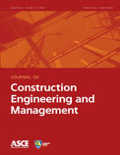
JOURNAL OF CONSTRUCTION ENGINEERING AND MANAGEMENT
Pioneering Research for a Resilient Built EnvironmentJournal of Construction Engineering and Management, published by the American Society of Civil Engineers (ASCE), is a premier scholarly journal dedicated to advancing the field of construction engineering and management. With an ISSN of 0733-9364 and an E-ISSN of 1943-7862, this respected journal boasts a noteworthy impact factor and is categorized in the Q1 quartile across significant fields such as Building and Construction, Civil and Structural Engineering, and Strategy and Management. Covering a broad spectrum of topics relevant to professionals, researchers, and students from its inception in 1982 through 2024, the journal emphasizes innovative research and practical applications that are vital to the construction industry. While it is not an open-access journal, it provides essential insights into the evolving dynamics of construction management, regulatory changes, and technological advancements, making it an indispensable resource for anyone looking to stay at the forefront of their field.
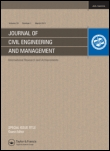
Journal of Civil Engineering and Management
Connecting academia and industry for strategic advancements.Journal of Civil Engineering and Management, published by Vilnius Gediminas Technical University in Lithuania, is a prominent open access journal dedicated to the dissemination of cutting-edge research in both civil and structural engineering as well as strategic management. With the ISSN 1392-3730 and E-ISSN 1822-3605, this journal has been an essential resource for academics and industry professionals since its inception in 2002 and has continued through to 2024. Recognized for its high-quality publications, it ranks in the Q2 quartile in both the fields of Civil and Structural Engineering and Strategy and Management, reflecting its significant impact in the academic community with a Scopus ranking of #75 out of 379 and #121 out of 478 respectively. The journal embraces an open-access model, promoting wider distribution and accessibility of knowledge to foster innovation and collaborative advancements in construction practices and management strategies. It serves as a vital platform for researchers, professionals, and students looking to contribute to and stay informed about the latest developments in these dynamic fields.